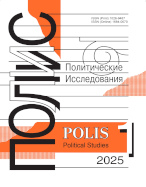Ethnicity and Fellow-Citizenship (Ethno-National Movements in Finno-Ugrian Regions of the Russian Federation)
DOI: 10.17976/jpps/2004.04.10
Kovalev V.A., Shabayev Yu.P. Ethnicity and Fellow-Citizenship (Ethno-National Movements in Finno-Ugrian Regions of the Russian Federation) . – Polis. Political Studies. 2004. No. 4. https://doi.org/10.17976/jpps/2004.04.10
The authors make an attempt to retrace political and ideological evolution of ethno-national movements in Finno-Ugrian regions of the Russian Federation within the past decade and a half. Considerable attention is given to the idea of ethnic self-determination and to the attempts of putting it into practice. Ethno-national leaders' efforts to form a new identity - that of the Finno-Ugrian world - are being characterized. These leaders' attitude is also estimated, towards Russian Federation. The conclusion made is to the effect that the said regions are witnessing ethnic communities' fragmentation, as well as their political interests' regionalization processes beginning to gather momentum.
See also:
Mironyuk M.G.,
Human Dimension of Federalism (Federalist Theories and Tendencies of the Federative Relations’ Development in Russia). – Polis. Political Studies. 2003. No3
Ashikhmina Ya.G., Panov P.V., Podvintzev O.B.,
On Criteria of Elections Estimation. – Polis. Political Studies. 2004. No4
Streltzina M.M.,
Institutional Conditions of Setting Up Governmental Departments in Russia and in the USA (With Russia’s Emergency Situations Ministry and the U.S. Homeland Security Department as Example). – Polis. Political Studies. 2004. No4
Khlopin A.D.,
Deformalization of Rules: Cause or Consequence of Institutional Traps?. – Polis. Political Studies. 2004. No6
Panov P.V.,
Alteration of Electoral Institutions in Russia (Cross-Regional Analysis). – Polis. Political Studies. 2004. No6





.jpg)






 print
print
.jpg)
.jpg)